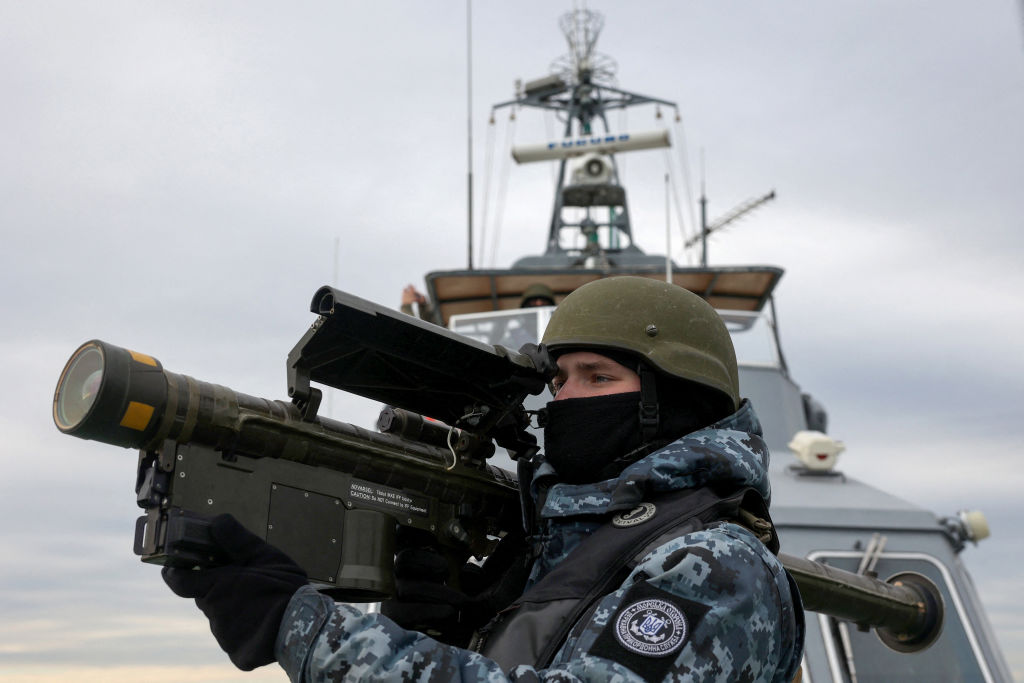Discussions yesterday between Russian and American negotiators in Saudi Arabia focused on a topic which seems, at first glance, an uncontroversial first step to a broader peace deal. US National Security Advisor Mike Waltz said that they would focus on a “maritime ceasefire so that both sides can move grain, fuel, and start conducting trade again in the Black Sea”.
For his part, Russian leader Vladimir Putin indicated last week that he was “favorable” towards implementing “a well-known proposal regarding the safety of navigation in the Black Sea”. He was referring to the 2022 grain deal from which Moscow withdrew the following year, claiming that the West was not fulfilling the conditions to enable Russian agricultural exports.
The Kremlin’s interest is unsurprising, since it stands to gain significantly from such a truce. Ukraine has enjoyed remarkable success in challenging Russia for control of the Black Sea. Kyiv successfully forced Russia’s navy out of the western part, disrupting Russian logistics and assisting Ukrainian attacks on occupied Crimea, and also reports having “fire control” over the neighboring Sea of Azov.
Ukraine has taken advantage of this to re-establish its main grain export route, nearing pre-war volumes and enjoying a much-needed economic boost. In contrast, following its withdrawal from the grain deal, Moscow complained of being unable to trade food and fertilizer products, making it likely that the Kremlin will now use its rapprochement with the US to push for greater liberalization. Having adapted successfully, Ukraine has little to gain.
That is before one turns to the broader impact of a truce on regional safety. Romanian and Bulgarian officials have already confessed to worries that such a ceasefire will expand the Russian navy’s operational area. Moscow has traditionally valued the Black Sea as an important space for projecting power into the Mediterranean, Middle East and Europe, meaning the Kremlin will eagerly take advantage of its newfound freedom of movement to expand its influence abroad. Then there is the issue of sequencing. Resolving the issue of the Black Sea now, before negotiations about a broader ceasefire, deprives Ukraine of a potential bargaining chip in those subsequent peace talks.
There are further signs of these early stages benefiting Moscow. Both sides have accepted in principle a moratorium on energy strikes. However, that does not take into consideration that, although Russia and Ukraine have attacked one another’s energy infrastructure during the conflict, these hits have functioned very differently. Kyiv’s strikes on Russia’s oil facilities have managed to harm the production and revenues that Moscow needs to sustain its war effort, with the potential to continue indefinitely. By contrast, Russian strikes on Ukrainian energy facilities have aimed at sapping morale by plunging civilians into freezing temperatures. As such, Moscow’s agreement to halt attacks on energy infrastructure is less of a concession than it is for Kyiv, winter having now passed.
With Waltz saying that the US may ask Russia to return abducted Ukrainian children as a “confidence-building measure”, we might then see how the Kremlin approaches a purely Ukrainian demand from which it cannot benefit. Russia will likely create obstacles or delays in the hope of the issue being lost or traded in the broader mix of peace negotiations to come.
These early stages are supposed to build confidence, but Ukraine won’t be feeling that way. In a far-reaching interview with Time magazine yesterday, Zelensky seemed increasingly pessimistic, saying that he thinks “Russia has managed to influence some people on the White House team”. Russia has given no indication of making any genuine concessions, and is getting back into the Black Sea after all Kyiv’s efforts to force it out. Last week, US Special Envoy Steve Witkoff revealed Putin’s claim to have prayed for the US President’s recovery from an assassination attempt. It was perhaps a rare moment of honesty from the Russian leader: his prayers are being swiftly answered.











Join the discussion
Join like minded readers that support our journalism by becoming a paid subscriber
To join the discussion in the comments, become a paid subscriber.
Join like minded readers that support our journalism, read unlimited articles and enjoy other subscriber-only benefits.
Subscribe